News
Group Raises Alarm Over Plot by NNPCL to Manipulate Dangote PMS Price

***Says Regime of Corruption by NNPCL Targeting Local Refineries
The Coalition of Energy Reforms Lawyers and Activists (CERLA) has accused the Nigerian National Petroleum Company Limited (NNPCL) of attempting to undermine Dangote Refinery’s efforts to address Nigeria’s energy crisis.
At a press conference, the coalition’s spokesperson, Okwa Dan, alleged that NNPCL spread falsehoods about Dangote Refinery’s pricing, claiming it sold PMS at N868 per liter.
Dan described this as a deliberate attempt to frustrate Dangote Refinery’s smooth operations and part of a larger regime of corruption aimed at frustrating local refineries and perpetuating fuel subsidy scams.
The coalition criticized NNPCL’s lack of transparency and accountability in crude oil management, citing its preference for importing substandard PMS from abroad.
This, they say, is fraudulent and counterproductive, benefiting only a select few.
Dan said: “The Coalition of Energy Reform Lawyers and Activists frowns at the despicable conduct of the NNPCL. It smacks of a mockery of the sincerity of the government towards addressing the energy challenges in the country.
“It also beats our imagination and discerning minds on why the NNPCL is bent on frustrating the operations of a wholly indigenous refinery in the country with the capacity to meet the daily needs of the citizens in the supply of PMS for local consumption.
“The preference by the NNPCL for the continued importation of substandard PMS from Malta and other locations around the world is fraudulent and counterproductive. It is indeed a regime to please a select few and to the detriment of sustainable growth and development in the country.
“The Mele Kyari-led NNPCL is indeed a disgrace and a clog in the wheels of progress in the country. It has over time constituted stumbling blocks in our quest for improved revenue earnings from crude oil sales and distribution. It has perpetuated a regime of astronomical fraud that has brought the country to its knees over the years.
“We find it difficult to understand why the NNPCL is uncomfortable with the smooth operations of a wholly indigenous organization that has made substantial investments in the country to address the energy challenges that have continued to eat deep into the revenue of the country through fraudulent practices.
“We wish to state that the NNPCL is an organization of heists. We also wonder why the NNPCL is the sole off-taker for PMS from the Dangote refinery. The implication is that the NNPCL still wants to perpetuate fraud in the pricing and distribution of PMS across the country. This much was evident in its hurried false statement that Dangote sold PMS at N868 per liter to it.
“It also failed to inform the general public that the current stock of crude procured by Dangote refinery was in dollars, hence the payment in dollars. The NNPCL went further to create an impression that the retail price of PMS is fixed by the Dangote refinery.
“The actions of the NNPCL imply that there is a subtle attempt to create an impression that the importation of PMS is cheaper than local production hence the falsehood that the Dangote refinery sold PMS at N868 per litre. This is so because the NNPCL is a beneficiary of the fuel subsidy scam that has impoverished the Nigerian people for decades.
“The NNPCL has refused to allow the local refineries to operate because of the fraud it is perpetuating in the importation of PMS into the country. Therefore, the operation of the Dangote refinery would bring to an end their fraudulent activities, which is essentially why they have been working against the operations of the Dangote refinery.
“It is obvious from all indications that the NNPCL is the albatross of the Nigerian people. Its operations have been opaque and shrouded in secrecy.
“It is thus obvious that the coming of the Dangote refinery has unsettled the Mele Kyari-led NNPCL, hence the recent drive to frustrate its smooth takeoff for the benefit of Nigeria and Nigerians. It remains a shame that Nigeria as an oil-producing country still relies on the importation of PMS from other countries while our refineries lay comatose. “
The coalition questioned why NNPCL, led by Mele Kyari, is uncomfortable with Dangote Refinery’s operations, considering its substantial investments in addressing Nigeria’s energy challenges.
The group called on NNPCL to cease its “slander campaign” against Dangote Refinery, warning of potential legal action against NNPCL and the federal government.
The coalition emphasized that Nigerians have suffered enough due to NNPCL’s lack of transparency and accountability.
“We urge NNPCL to bring to a halt the slander campaign it has ferociously launched at the Dangote refinery,” Dan said.
“We wish to state that the elephant in the room is the lack of transparency and accountability in the affairs of NNPCL. Nigerians have suffered enough in the hands of the Mele Kyari-led NNPCL. Enough is enough. “
News
BOWFT: Edo First Lady, Obaseki, Rallies Wives of Governors to Address Teenage Pregnancy and Abortion

The Edo State First Lady, Dr. (Mrs.) Betsy Obaseki, alongside her Oyo State counterpart, Mrs. Tamunominini Makinde, has called for concerted efforts to combat the rising prevalence of teenage pregnancy and abortion, which significantly hinder the social development of young girls in Nigeria.
This call to action was made during a seminar in Benin City, marking the fourth edition of the Betsy Obaseki Women Football Tournament (BOWFT), themed “Say No to Teenage Pregnancy and Abandonment.” Former First Ladies of Ekiti and Imo States, Erelu Bisi Adeleye-Fayemi and Nneoma Okorocha, respectively, also joined the initiative, advocating for improved conditions for the girl-child.
In her opening remarks, Mrs. Obaseki highlighted the progress made in the fight against social vices impacting young girls, noting a significant increase in the number of states adopting the Violence Against Persons (VAP) Law, which has grown from 12 to 35 states. She emphasized the importance of these laws in protecting the girl-child and holding violators accountable.
“We gather here every year to address social vices affecting the girl-child in the country. We are not just here to play football but to address these challenges,” she stated. “Teenage pregnancy and abortion have become serious issues in Nigeria, particularly in the South-South region, exposing children to various health risks, including Vesicovaginal Fistula (VVF). Poverty has made families vulnerable, leading to the exploitation of young children.”
Mrs. Obaseki also noted the effective measures implemented in Edo State over the past eight years to safeguard the girl-child, including the prosecution of offenders under the VAP Law.
Former First Ladies Adeleye-Fayemi and Okorocha, along with other attendees, expressed gratitude to Mrs. Obaseki for her impactful initiatives that have positively influenced many lives.
The keynote speaker, Ambassador Nkoyo Toyo, praised Mrs. Obaseki’s innovative approach, referring to it as a model for addressing teenage pregnancy and child motherhood in the South-South region. She underscored the importance of empowering girls to assert their rights and make informed decisions about their lives.
“The Obaseki model offers a comprehensive strategy to address the multifaceted challenges facing the girl-child in Nigeria,” Toyo remarked. “It provides a framework for keeping girls engaged and winning the battle against the issues they confront.”
The seminar served as a platform for collaboration and dialogue among stakeholders dedicated to enhancing the welfare and rights of young girls in Nigeria.
News
World Food Day: FAO Reports Over 3 Million Children Under-5 Stunted Due to Undernutrition in Nigeria
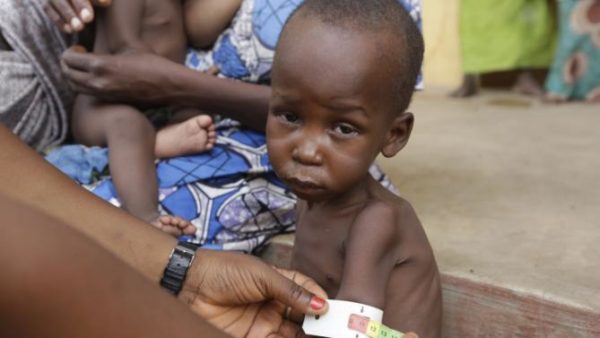
On the occasion of World Food Day, the Food and Agricultural Organization (FAO) of the United Nations has highlighted a concerning statistic: approximately three million children under the age of five in Nigeria are suffering from stunting, primarily due to undernutrition. This alarming figure reflects the broader issue of food insecurity affecting millions across the nation.
The FAO has attributed the current food crisis in Nigeria to several factors, including unsustainable agricultural practices, recent flooding, and ongoing insecurity, which have combined to exacerbate the food security situation. Currently, over 4.5 million people are identified as food insecure in Nigeria, prompting urgent calls for intervention to support local farmers and enhance agrifood practices.
This declaration was made by Daouda Doumbia, the Head of the FAO Office in Nigeria’s Northeast Sub Office, during a collaborative event with the Adamawa State government in Yola. Represented by Abdullahi Usman, the FAO Field Office Coordinator for Adamawa, Doumbia underscored the dire need for improved food access and agricultural sustainability in the region.
He stated, “The theme ‘Right to Food for a Better Life and a Better Future’ calls for increased access to food for everyone, emphasizing food as a basic human right.” Doumbia explained that the northeast region faces significant food insecurity challenges exacerbated by climate change, and he urged stakeholders to focus on building a more resilient agrifood ecosystem.
Recent flooding has had a devastating impact on agricultural production, affecting around 104,000 hectares of rainfed cropland and 6,570 hectares of irrigated land. This has resulted in an estimated food loss of 166,731 metric tonnes, potentially depriving approximately 1.6 million people of access to food for six months. The flooding has significantly impacted states like Borno and Adamawa, which are among the worst affected.
Doumbia expressed alarm over the stunting issue, saying, “It is alarming that approximately 3 million children under five in Nigeria are stunted, reflecting the severity of undernutrition.” He further highlighted the problem of malnutrition manifesting in various forms, including micronutrient deficiencies and rising obesity rates among adults, indicating a failure of food systems to provide essential nutrients.
The FAO representative stressed the importance of sustainable agricultural practices, noting that Nigeria is home to numerous local plant and animal species that could enhance nutrition and resilience within its agrifood systems. He warned, “Unsustainable agricultural practices threaten our biodiversity, which is vital for ensuring food security.”
The FAO is committed to supporting affected communities by distributing essential resources. Doumbia revealed plans to support 49,000 households, approximately 343,000 individuals, across the BAY states (Borno, Adamawa, Yobe) with improved seeds, NPK fertilizer, and water pumps during the upcoming 2024-2025 dry season. This initiative aims to restore livelihoods and boost food production in vulnerable communities.
Doumbia emphasized the need for a collaborative approach involving the government, private sector, civil society, and local communities to address food insecurity comprehensively. He noted the critical role of youth in agricultural innovation and sustainable practices, urging their engagement in advocating for healthy diets and resilient agrifood systems.
Moreover, Doumbia highlighted the importance of women in agriculture, stating that they should have a voice in decision-making processes. He remarked on the FAO’s livestock restocking programs targeting women-headed households, aimed at improving food availability in communities.
As the event progressed, Governor Ahmadu Umaru Fintiri of Adamawa State, represented by the state commissioner for Agriculture, David Jatau, called for strategies to enhance crop yields in the face of climate change challenges. Fintiri pointed out that globally, approximately 2.8 billion people struggle to afford a healthy diet, largely due to limited access to modern farming tools among smallholder farmers.
Commissioner Bello Diram, overseeing Reconstruction, Rehabilitation, Reintegration, and Human Services in Adamawa, spoke about the government’s initiatives to support local farmers. He highlighted the provision of access to farming equipment, quality seeds, and fertilizers as essential measures to bolster food production, particularly following the flooding that has affected over 50,000 residents.
The FAO and local officials reiterated the urgent need for effective interventions to tackle food insecurity, which has resulted in significant suffering for millions. As they commemorate World Food Day, the call to action is clear: there is a need for sustained efforts to ensure that every individual has access to sufficient, safe, and nutritious food, thereby fostering a healthier future for Nigeria.
News
Global Handwashing Day: UNICEF and BERWASSA Provide Hygiene Kits to Benue IDP Camp
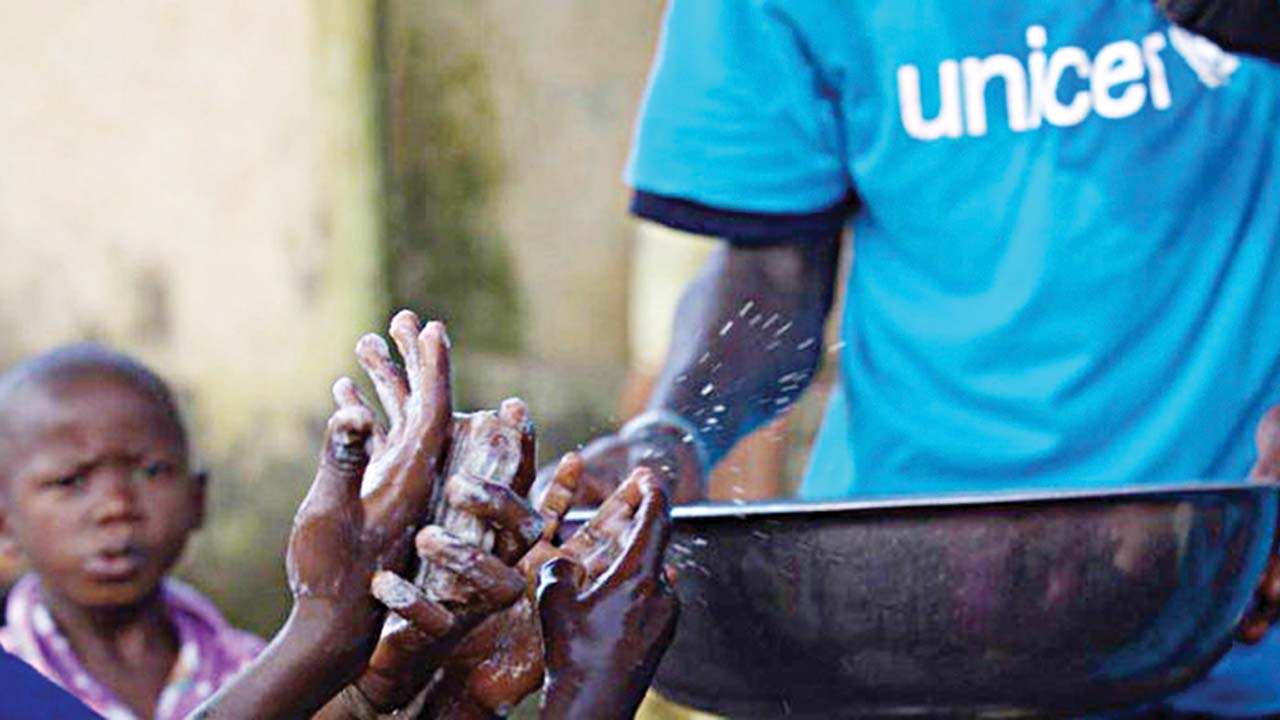
In observance of the 2024 Global Handwashing Day, the United Nations Children’s Fund (UNICEF) and the Benue State government, through the Benue State Rural Water Supply and Sanitation Agency (BERWASSA), have taken a significant step to support vulnerable communities by donating hygiene kits to 100 households at the Ichwa Internally Displaced Persons (IDP) camp in Makurdi. This initiative underscores the ongoing efforts to improve hygiene practices among the displaced population.
Additionally, the Benue State government announced a release of ₦700 million aimed at enhancing Water Sanitation and Hygiene (WASH) facilities across the state. The Commissioner for Water Resources, Environment, and Climate Change, Mr. Odoh Ugwu, made this announcement during the Global Handwashing Day celebration at the Ichwa IDP Camp.
Mr. Ugwu emphasized that this initiative aligns with the global target of ensuring access to hand hygiene for all by 2030. He highlighted the pressing need for improved hygiene practices in Nigeria, noting that many residents, particularly in Benue State, lack access to soap and running water. Current data reveals that only five percent of households in the state have a designated area for handwashing with soap and running water.
In his speech, Mr. Ugwu urged community stakeholders, including traditional rulers, to enhance efforts in increasing access to safe water and sanitation. This initiative aims to mitigate disease transmission and foster a safer living environment. He expressed gratitude to Governor Alia for his commitment to the WASH sector and recognized UNICEF, BERWASSA, the International Organization for Migration (IOM), and the State Emergency Management Agency for their collaboration in organizing the event.
Mr. Tony Mkpen, General Manager of BERWASSA, explained that the decision to hold the event at the IDP camp was prompted by the poor living conditions and the necessity for residents to adopt better hygiene practices. He pointed out that the day serves as a reminder of the significance of handwashing, especially in environments where sanitary conditions are lacking.
“We celebrated Global Handwashing Day with the IDPs to promote hygienic practices, which are essential in reducing illness,” Mkpen stated. He further remarked on the importance of the campaign, noting that BERWASSA has been actively engaged in promoting water sanitation and hygiene practices in local communities, contributing to the state achieving the status of 11 local governments being Open Defecation Free (ODF).
Mkpen urged the people of Benue to embrace toilet ownership and proper handwashing practices to combat open defecation, which contributes to numerous health issues. “Open defecation contaminates water sources, which leads to health problems. We need to cultivate the habit of using toilets and washing hands afterward,” he stressed.
The Executive Chairman of the State Universal Basic Education (SUBEB), Dr. Grace Adagba, participated in the event by donating cartons of soap to the IDPs. She, along with Scholastica Lan, PRO of the Benue NGO Network (BENGONET), encouraged community members to prioritize handwashing to prevent the spread of communicable diseases.
The camp manager, Jennifer Vangeryina, expressed her gratitude to BERWASSA and UNICEF for their support and for celebrating Global Handwashing Day with the IDPs. The event included a handwashing demonstration by the Commissioner, along with a tap production competition for children from local schools. Participants, including students Azahan Godwin and Jato Cynthia, received prizes such as school bags and water bottles, acknowledging their involvement and reinforcing the importance of hygiene practices.
This initiative highlights the commitment of both UNICEF and the Benue State government to improve the lives of IDPs while fostering a culture of hygiene and health in the region.
-

 Entertainment24 hours ago
Entertainment24 hours agoDavido Declares ‘Timeless’ His Best Album
-

 Entertainment24 hours ago
Entertainment24 hours ago‘Adire’ Secures Four Nominations at the Best of Nollywood Awards
-

 Entertainment24 hours ago
Entertainment24 hours agoVan Vicker Celebrates 21st Wedding Anniversary: “I Have No Regrets”
-

 Politics7 hours ago
Politics7 hours agoPresidency Assures: No Leadership Void as Tinubu, Shettima Remain Engaged Abroad
-
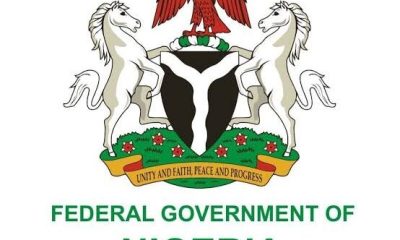
 Business7 hours ago
Business7 hours agoFuel Price Hike: FG Maintains Routine Engagement with Organised Labour
-
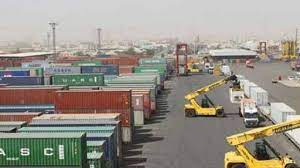
 News6 hours ago
News6 hours agoKebbi Government Disburses N629m Compensation for Tsamiya Inland Dry Port and Argungu Old Bypass Road Dualization
-

 Politics6 hours ago
Politics6 hours ago“Give Tinubu 40 Years, He Won’t Go Anywhere” – Adebayo
-
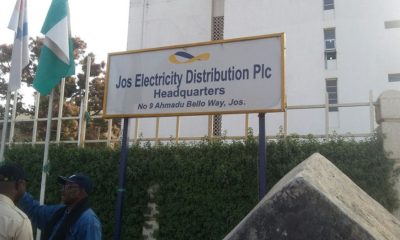
 News6 hours ago
News6 hours agoJos DisCo to Launch Feeders Management System and Bilateral Arrangements








